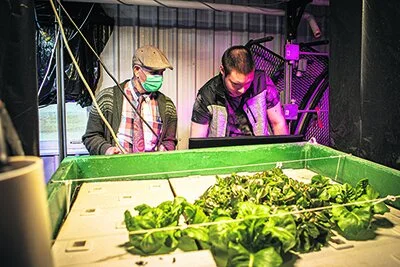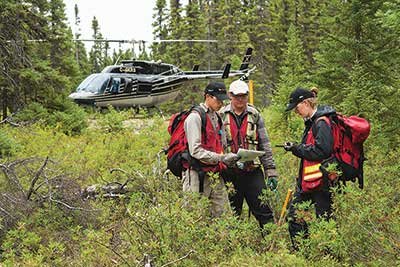Dermatologist Dr. Geeta Yadav tells the story of one of her patients, an Indo-Canadian man with severe eczema, who told her he had waited nine years to be correctly diagnosed. “I was able to give him treatment that made him 100 per cent better in a matter of two months,” says Dr. Yadav. “It is awful to imagine that someone would have to suffer like that because the diagnosis wasn’t made for so long and the severity wasn’t identified sooner.”
Read MoreJust a few decades ago, schizophrenia was known as a “kiss of death” diagnosis. The prevailing view was drained of all hope: individuals with this form of mental illness had no chance to recover.
Read More“How does this work?” That’s a question Keelan Hyde has always been keenly interested in, from his parents’ first computer to the internet of things (IoT) to linking devices to gain new – and perhaps surprising – results.
Read MoreWhen a local brewery encountered difficulties with filling craft beer into cans, a partner known for technical expertise and innovation came to mind: the Southern Alberta Institute of Technology (SAIT). There, a group of students in the mechanical engineering technology program got to work on designing a solution for automating the canning process.
Read MoreOne of the worst nightmares as a parent is not being able to help when your child is in pain. But what if you don’t even realize they are suffering?
Read MoreCanadore College, headquartered in North Bay, Ontario, has a proven track record with innovative applied research specifically designed to meet the needs of industry. Now it’s about to expand on that reputation and move into the realm of delivering reliable and safe drinking water systems to Indigenous communities. As part of its Clean Water Initiative, Canadore is creating a Clean Water Learning Lodge on its College Drive Campus to develop a comprehensive platform of products, services and education programs. The outcomes will include programs tailored to the needs and values of First Nations, and will inspire Indigenous learners to take on fulfilling careers in water management.
Read MoreIn sudden cardiac arrest, every minute that passes before the heart is restarted counts. When the brain is deprived of oxygen for more than four to six minutes, the risk of irreparable damage increases exponentially.
Read MoreMore than ever, Canadians pay close attention to food product labels. They choose healthy options and want to support brands committed to sustainability and corporate social responsibility.
Read MoreCanadian charities do tremendous work in communities across the country by channelling donor funds into causes that make a critical difference to the lives of people in need and to our world.
Read MoreThe last two years have produced a seismic shift in the economy, the labour market, and the values and structures underpinning our working lives. The COVID-19 pandemic destabilized many established workforce systems, and what has emerged out of these upheavals is a much different reality for employees and employers alike.
Read MoreFrom infrastructure and machinery to technology and health, many of the fundamentals of our modern life rely on metals and minerals.
Canada has long been recognized as a leading mining nation and host to a minerals sector that continuously advances exploration, mining and related support activities. In producing 60 minerals and metals, the industry continues to drive job creation and economic activity in every region, yet it has also been subject to a number of changes over the past decade.
Read More“For the Mamalilikulla First Nation, every day is Ocean Day,” says John Powell, chief councillor of the traditional land and waters of the Gwaxdlala/Nalaxdlala (Lull Bay/Hoeya Sound). “Every day is land day. Every day is sky day. Every day, we connect to our ancestors and the stories that bind us to the reason that we created an IPCA under our ancient traditional law of Aweenak’ola.”
Read MoreGold: with a production value of $12.3-billion, and 182 tonnes mined in 2020, gold is Canada’s most valuable mined commodity, and the country ranks fifth among the largest global producers. Yet in order to continue delivering strong results over the long term, the industry has to address a number of key challenges that include a shift to exploring new mining sites, delivering a strong sustainability performance and attracting new talent.
Read MoreWater plays a central role in every aspect of society, from health and food security to economic development. Disruptions to water supplies – for example, due to the floods, droughts or wildfires that happen with increasing frequency across Canada and the world – should serve as wake-up calls and inspire action.
Read MoreHealth crises tend to reveal health inequities and health-care gaps. The COVID-19 pandemic, for example, illustrated the need to make Canada’s health systems more resilient, find a way to efficiently mobilize and integrate new knowledge, and actively engage community partners, especially those representing marginalized and underserved populations.
Read MoreThe federal government has taken another step towards establishing Canada’s open banking system, selecting an experienced fintech leader to lead development of a “made-in-Canada” regime.
The Department of Finance Canada has named Abraham Tachjian the open banking lead. Mr. Tachjian has extensive experience related to open banking in Canada and internationally, as well as expertise in digital banking and law.
Read MoreEmployers responding to shifting employee priorities and values
The impacts of the COVID-19 pandemic continue to ripple through all facets of Canadian life, including the economy, technology and social norms. Transformation has also been dramatic for Canadian workers in terms of where and how they work, as well as their values and motivators related to their employment.
Read MoreAs we step into the future, we have learned that nothing is certain except change itself. The good news: when you build a great workplace for all, every organization can rise to meet the challenge of tomorrow.
Read MoreHands-on education brings many advantages and skills to students. And when the subject is a WWII Sherman tank, the lessons can get pretty interesting.
Read MoreIt seems easier to count lives that have been lost than to calculate those that have been saved. Yet in consideration of the deathly toll of infectious diseases like polio, smallpox or influenza – and the subsequent success in mitigating their impact through immunizations – the World Health Organization estimates that vaccinations save about two million to three million lives annually.
Read More



















